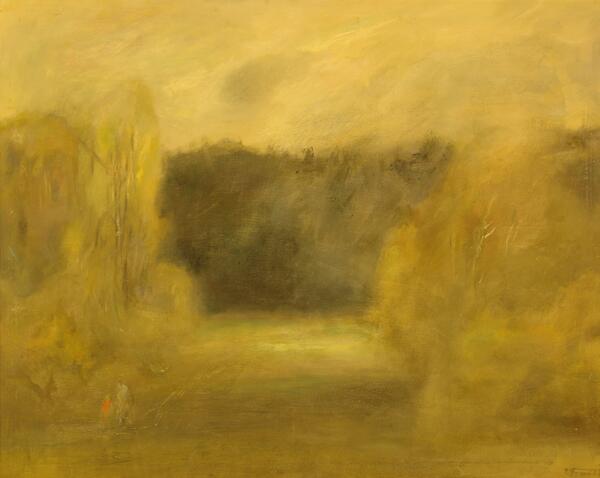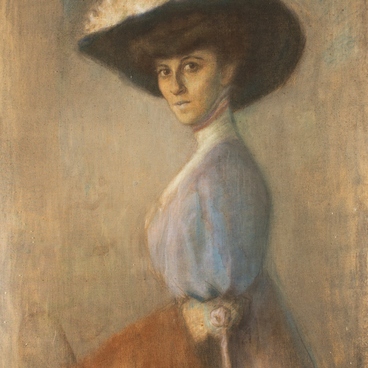The paintings of contemporary artist Elena Utenkova-Tikhonova (b.1965) possess a subtle poetry. She manages to present the world around her as a memory through the haze of time. The images of her work are mysterious and at the same time extremely laconic and expressive. Her works are imbued with lyricism, dreaminess, subtle transfer of emotions, color combinations, which set a certain mood.
The artist was born in Moscow in the family of the artist Evgeny Utenkov, a student of the artists Pavel Kuznetsov and Nikolai Krymov. She graduated from the Moscow Art School in 1983, and studied at the Surikov Institute until 1989. In 1990 she became a member of the Moscow Union of Artists. She is a winner of the Moscow International Exhibition and Competition ‘Golden Brush’. Additionally, she also writes prose about personal memories and reflections on the meaning of life and the surrounding nature. Her works are kept in the collection of the State Russian Museum, the Museum-Estate ‘Kuskovo’ and in other local and private collections in Russia, Europe, the USA, and Japan.
The artist spends every summer in Tarusa, and the local region has become an inexhaustible source of creative inspiration and energy for her.
Her work ‘The Gray Day’ from the gallery’s collection is made in oil, although the artist’s favorite technique is pastel. Utenkova-Tikhonova still masterfully reproduces the nature of the drawing with pastels. It depicts an autumn landscape, barely distinguishable by the golden foliage of the trees. The line of the forest is represented by a dark accent, nature is shrouded in a misty haze, a grayish cloudy sky hangs over. The shade-figures of two small human beings are barely indicated in the painting. Their images seem to be introduced by the artist to give the work a more tangible character. The composition is almost abstract, the area is almost unrecognizable and might be created as a collective image. The painting is imbued with mystery and understatement. The artist describes her landscapes the following way: ‘They don’t pretend to actually represent this or that place, careful copying of details only takes me away from the subject of the image. Landscape for me is a state of soul, its response to the beauty of God’s world. "
The artist was born in Moscow in the family of the artist Evgeny Utenkov, a student of the artists Pavel Kuznetsov and Nikolai Krymov. She graduated from the Moscow Art School in 1983, and studied at the Surikov Institute until 1989. In 1990 she became a member of the Moscow Union of Artists. She is a winner of the Moscow International Exhibition and Competition ‘Golden Brush’. Additionally, she also writes prose about personal memories and reflections on the meaning of life and the surrounding nature. Her works are kept in the collection of the State Russian Museum, the Museum-Estate ‘Kuskovo’ and in other local and private collections in Russia, Europe, the USA, and Japan.
The artist spends every summer in Tarusa, and the local region has become an inexhaustible source of creative inspiration and energy for her.
Her work ‘The Gray Day’ from the gallery’s collection is made in oil, although the artist’s favorite technique is pastel. Utenkova-Tikhonova still masterfully reproduces the nature of the drawing with pastels. It depicts an autumn landscape, barely distinguishable by the golden foliage of the trees. The line of the forest is represented by a dark accent, nature is shrouded in a misty haze, a grayish cloudy sky hangs over. The shade-figures of two small human beings are barely indicated in the painting. Their images seem to be introduced by the artist to give the work a more tangible character. The composition is almost abstract, the area is almost unrecognizable and might be created as a collective image. The painting is imbued with mystery and understatement. The artist describes her landscapes the following way: ‘They don’t pretend to actually represent this or that place, careful copying of details only takes me away from the subject of the image. Landscape for me is a state of soul, its response to the beauty of God’s world. "


